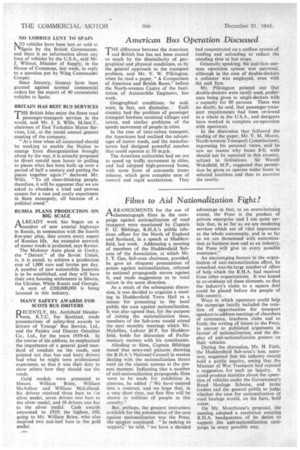Films to Aid Nationalization Fight?
Page 24

If you've noticed an error in this article please click here to report it so we can fix it.
A RR A NGEM E NTS for the use of A-1-cinematograph films in the campaign against nationalization of road transport were mentioned by Captain F. G. Ribbings, R.H.A.'s public relations officer for the North of England and Scotland, in a speech at Huddersfield, last week. Addressing a meeting of members of theHuddersfield Subarea of the Association, at which Mr. J. T. Gee, Sub-area chairman, presided, he gave an eloquent presentation of . points against nationalization, referred to national propaganda moves against it, and made suggestions as to local action in the same direction.
As a result of the subsequent discussion, it was decided to organize a meeting in Huddersfield Town Hall as a means for presenting to the local public the case against nationalization. It was also agreed that, for the purpose of raising the nationalization issue, members of the Sub-area would attend the next monthly meetings which Mr. Malallieu, Labour M.P. for Huddersfield, holds for discussion of Parliamentary matters with his constituents. Alluding to films, Captain Bibbings stated that news-reel pictures showing the R.H.A.'s National Council in session dealing with the nationalization threat were on the cinema screens at the present moment. Indicating that a number of anti-nationalization propaganda films were to be made for exhibition in. cinemas, he added ;" We have-entered
into a contract, and we hope that, in•a very short time, our first film will be
shown to millions of people in this Country." But, perhaps, the greatest instrument available for the presentation of the case against nationalization was the Press, the spe*ker continued. "In seeking its support,' he said, "we have a decided advantage in that, to an overwhelming extent, the Press is the product of private enterprise and I am quite certain that, in so far as we are rendering services which are of vital importance to the Whole community, and in so far as we are threatened with extermination as business men and as an industry. the Press will give us every possible assistance." • An encouraging feature in the organization of anti-nationalization effort, he remarked, was the large number of offers of help which the R.H.A. had received from other organizations. It was hoped to co-ordinate all these elements, so that the industry's claim to a square deal could be placed before the people of this country. Ways in which operators could help the campaign locally included the creation of opportunities for transport speakers to address meetings of chambers of commerce, luncheon clubs and so forth; the writing of letters to the Press, in answer to published arguments in favour of nationalization, and the display of anti-nationalization posters on their vehicles. During the discussion, Mr. H. Firth, the Huddersfield Sub-area's hon. secretary, suggested that the industry should hold a public inquiry, seeing that the Minister of War Transport had rejected a suggestion for such an inquiry. It could produce statistics about the operadon of vehicles under the Government's Road Haulage Scheme, and invite traders and the general public to judge whether the case for nationalization of road haulage would, on the facts, bold water. • On Mr. Moorhouse's proposal, the meeting adopted a resolution assuring R.H.A. headquarters of its desire to support the anti-nationalization campaign in every possible way.




























































